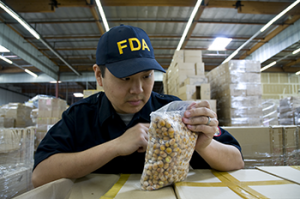My friend, Roy Costa from Florida, sent along this piece and I deemed it worthy.
 The foreign supplier verification rule is foreign to many importers, October 20, 2018
The foreign supplier verification rule is foreign to many importers, October 20, 2018
The Foreign Supplier Verification Rule (FSVP), 21 CFR Part 1, Subpart L, is the part of the Food Safety Modernization Act that regulates the importation of food covered by FDA. While the Act when into effect in 2015, some importers have not yet fully implemented an FSVP program.
An FSVP program is a risk-based system that ensures that foreign suppliers meet the same US rules for food safety as domestic suppliers. This means that importers must verify that FDA’s rules, the Current GMP Hazard Analysis and Risk Based Preventive Controls for Human and Animal Foods, and the Produce Safety rules, have been implemented by suppliers.
Importers bare the responsibility for verification of the safety of foods imported into the US. The Customs filings now include a line item for the “FSVP Importer”. This entry utilizes the Dunn and Bradstreet’s unique facility identifier-the DUNS Number; no food maybe imported without this filing. Whoever is identified as the FSVP Importer must be qualified through education and experience to understand any document submitted for verification, and is subject to unannounced FDA inspection.
The FSVP rule allows third-party audits, microbial, physical and chemical testing and operational records to be used for verification purposes. The key documents an importer must verify are the Food Safety Plan of foreign manufacturers, and the records that show compliance with the Produce Safety rule.
In order to understand these complex verification documents, one must understand the Hazard Analysis and Critical Control Point (HACCP) concept. Education in the Preventive Controls and Produce Safety rules will be necessary for most importers. Without a scientific background, understanding how to successfully apply the five preliminary HACCP steps and the seven HACCP principles is impossible, and the Produce rule requires a deep understanding of Good Agricultural Practices.
Some importers will not be qualified to make decisions about supplier approval, or even understand what is required of them, without training.
An importer must prepare his own FSVP program for each commodity he obtains, based on a risk assessment similar to HACCP. He can only do this if he is a FSVP Qualified Individual, although he can hire or use another Qualified Individual, if he is not so qualified.
The barriers of entry are high. If a supplier does not meet the rules, or if the importer cannot verify the safety of foods, no such foods can be obtained. This could put some importers out of business, and restrict trade in foreign foods.
The impact is huge for the global economy. Currently, imported foods make up an estimated 15 percent of the U.S. food supply, including 50 percent of fresh fruits, 20 percent of fresh vegetables and 80 percent of seafood.
The FSVP rule prohibits anyone with a financial interest in the outcome of verification to have a financial interest in an approval decision. The problems with conflicts of interest in this scheme are readily apparent, since many importers also own the operations of the foreign supplier, and virtually all importers have some kind of monetary incentive for bringing products into the US.
FDA has the authority to inspect the records of the FSVP Importer, and they typically do not notify in advance of a routine inspection. Once in the office, FDA has access to virtually all the records of the importing firm, and will expect that the firm has a Qualified Individual, policies and procedures, records, and a risk-based system to make decisions about supplier approval, with an approved supplier list. Without these vital documents, there will be no way an importer can demonstrate compliance.
At this time, FDA is making inspections to primarily educate the industry, but they will act if they find an importer violating US rules or obtaining unsafe foods.
With such dire consequences possible, one would expect that an importer would seek education in areas of legal compliance, but the industry has not shown overwhelming interest in taking the training needed to understand their responsibilities.
Eventually, the agency will take a focused approach to weeding out the non-compliant importing operations, but the job will be difficult. Policing these complex importer arrangements will not be an easy assignment; it is well known the importers sometimes flaunt the rules that have been in place, and engage in port shopping, ignoring Import Alerts, and outright deception. These new regulations should allow FDA to be more effective in detecting criminal activity, and I expect that penalties will be severe for importers who bring in contaminated foods that cause illness and death to US consumers.
I also expect that product liability will eventually stretch back to the importer in such cases, and that lawsuits will take into consideration the compliance history of the importer when perusing justice for victims of foodborne illness.
I strongly recommend that both foreign suppliers and importers take the Food Safety Preventive Controls Alliance FSVP course, and the other FSPCA relevant courses as needed, Preventive Controls for Human and Animal Foods, and Produce Safety Rules, and learn how to develop a compliant FSVP program.
Contact Environ Health Associates, Course Administration Manager; Katherine Jones 386-316-7266 for course registration.
